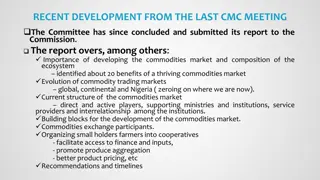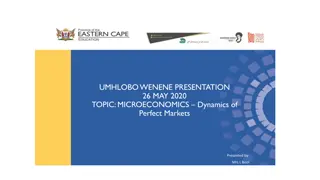Centrica's Flexibility Market Vision for Future Markets: Policy and Industry Developments
Centrica's Regulatory Affairs team shared insights at the Cornwall LEM sign-off event regarding the importance of independent flexibility market platforms to deliver transparency, neutrality, and coordination between DSOs and ESOs. They emphasized the need for updated network security standards, addressing stakeholder concerns, and leveraging open data for optimal flexibility markets by 2023. The vision includes prioritizing flexibility procurement, standardizing processes, and encouraging new providers through auction-based procurement.
Download Presentation

Please find below an Image/Link to download the presentation.
The content on the website is provided AS IS for your information and personal use only. It may not be sold, licensed, or shared on other websites without obtaining consent from the author.If you encounter any issues during the download, it is possible that the publisher has removed the file from their server.
You are allowed to download the files provided on this website for personal or commercial use, subject to the condition that they are used lawfully. All files are the property of their respective owners.
The content on the website is provided AS IS for your information and personal use only. It may not be sold, licensed, or shared on other websites without obtaining consent from the author.
E N D
Presentation Transcript
Cornwall LEM Sign-off Event Policy and industry developments to support future flexibility markets Helen Stack, Regulatory Affairs
Policy and industry developments to support future flexibility markets Session agenda Helen Stack, Centrica Business Solutions Randolph Brazier, ENA Christopher Galpin, BEIS Patrick Cassels, OFGEM Q&A - We will take questions at the end of the session compered by the Moderator. Please post questions in the chat function. v
Why the LEM? The LEM proves that independent flexibility market platforms can help deliver: Transparency Demonstrable neutrality DSO-ESO coordination Closer to real-time procurement Auction-based procurement Market access for multiple participant types All attributes Centrica is looking for in the wider electricity system to enable the flexibility needed to help deliver net zero at least cost. v
Centricas flexibility market vision Removing barriers to flexibility and enabling further growth: Network security standards need updating to allow DNOs to maximise use of flexibility Address stakeholder concerns about the interactions between flexibility services and network solutions like Active Network Management (ANM). Networks must consider the option-value of flex when choosing between using flex services vs physical reinforcement vs other network solutions as well as any wider societal/industry impacts Open data. With more granular data from increased network monitoring. Data is key to identifying where to connect and provide services to the system. High connection costs can be prohibitive for business customers wanting to install flexible assets. We hope Ofgem will rebalance network reinforcement costs through its Access SCR work. Local flexibility markets can help by helping DNOs manage constraints at least cost. v
Centricas flexibility market vision Ensuring optimally structured and fully functioning flexibility markets by 2023: Network operators to consistently procure flexibility before reinforcement (or other network-based solutions), where cost-effective. We hope to see DNOs significantly increasing procurement volumes. Networks to continue standardising processes already reducing participation costs. Avoiding barriers to entry in T&Cs for aggregated flexibility, including residential. Closer to real-time procurement. DNOs should build on the lessons learnt by the ESO, by including shorter-term products in procurement strategies. Short-term markets become more relevant as the uptake of EVs and electrified heat grows. Limit level of long-term bilateral contracts, allowing new and innovative flexibility providers to enter the market move to auction-based procurement. v
Centricas flexibility market vision What needs to happen: Markets are needed to bring forward new forms of flexibility such as services from smart EV charging. Market design must maximise participation, especially at smaller scale. Ofgem must take action to remove monopoly network conflicts of interest to fully harness flexibility. Network decision-making must be impartial, transparent and justifiable. v Access rights and security standards at distribution level must enable local flexibility. Active Network Management risks limiting flexibility. Setting the right foundations for flexibility policy now, to hit the UK s longer-term net zero target We welcome indications that the upcoming Energy White Paper will underline the importance of flexibility and the Smart Systems & Flexibility Plan review.























